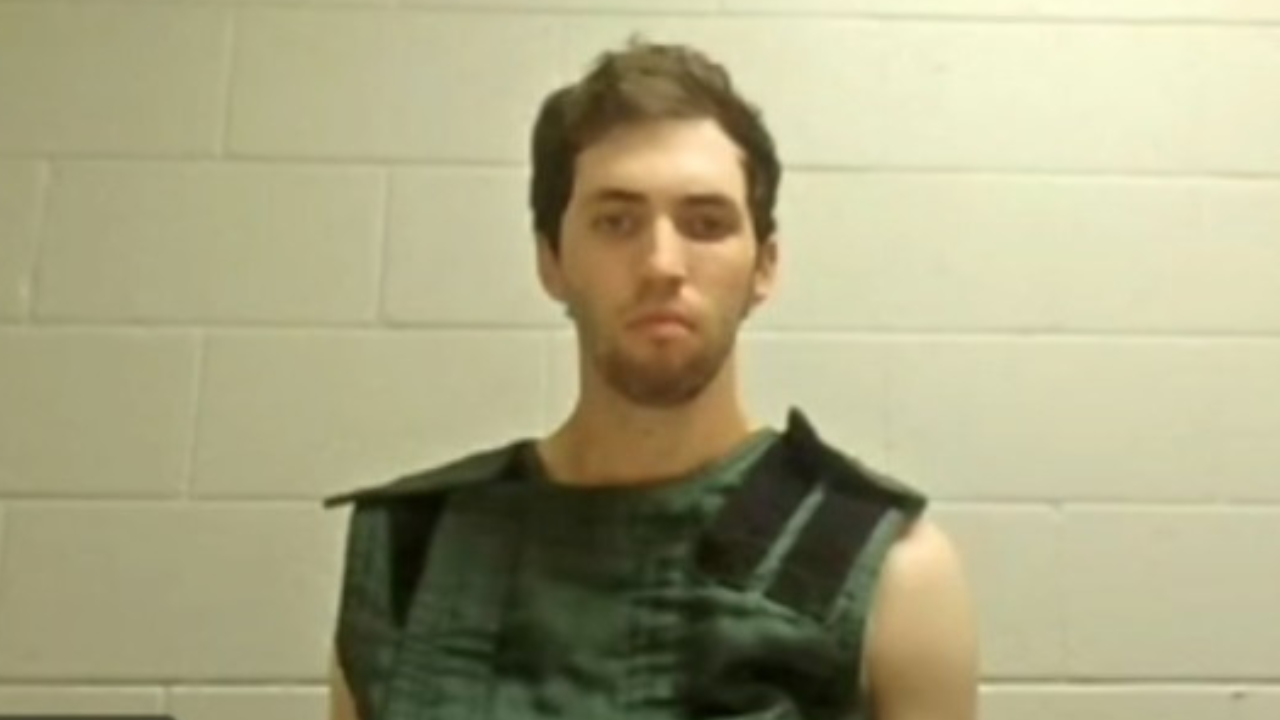PROVO, Utah — Wearing a green anti-suicide smock, Tyler Robinson, the man accused in the shooting death of activist Charlie Kirk, appeared virtually at his first court appearance on Tuesday, hours after prosecutors announced he has been charged with Aggravated Murder and that they will seek the death penalty in the shooting at Utah Valley University.
Watch the full court appearance of Tyler Robinson below:
Robinson did not speak during the court appearance as Judge Tony Graf read the charges against him, and set the next hearing for Sept. 29. In addition, the judge acknowledged that a pretrial protective order had been filed against Robinson by Kirk's family.
Earlier Tuesday, Robinson was officially charged with Aggravated Murder, along with Felony Discharge of a Firearm, two counts of Obstruction of Justice, two counts of Tampering with a Witness and Violent Offense Committed in the Presence of a Child.
Utah County Attorney Jeffrey Gray said he was not pressured into deciding to pursue the death penalty by the Trump administration, but acknowledged that he had spoken to people connected to the president.
Watch full briefing on Robinson charges below:
In the indictment against Robinson, a transcript of a conversation between him and his roommate showed a confession where Robinson was asked whether he shot Kirk, to which Robinson allegedly said, "I am, I'm sorry," adding, "I had enough of [Kirk's] hatred. Some hate can't be negotiated."
Robinson told his roommate to look under his keyboard, where the roommate found a note that read, “I had the opportunity to take out Charlie Kirk and I’m going to take it.”
Robinson said he had been planning the shooting for "a bit over a week. The two continued a conversation before Robinson told his roommate to "delete this exchange," and then said he was going to willingly turn himself in, which is what he ended up doing.
According to investigators, Robinson's mother saw the first photos released of the alleged suspect after the shooting and thought it looked like her son. After Robinson told his mother he was at home sick the previous day, his mother shared concerns with her husband that Tyler appeared to be the suspect, to which her husband agreed.
Robinson's mother told police that Tyler had "become more political and had started to lean more to the left – becoming more pro-gay and trans-rights oriented," which led to conversations between the 22-year-old and his family. In one of the conversations, Tyler mentioned Kirk's upcoming event at UVU and accused Kirk of "spreading hate."
Following the shooting, Robinson's father suspected his son had used a rifle that had been given to Tyler as a gift. When his father reached out to Tyler by phone, Robinson implied that he was set to take his own life, but was convinced to meet with his family at their home.
Robinson "implied" that he was Kirk's shooter to his family, and said he did it because there is "too much evil and [Kirk] spreads too much hate." He added that he "couldn't go to jail and just wanted to end it."
A family friend, at Robinson's father's request, spoke with Tyler and convinced him to turn himself in to the police.
Robinson will remain behind bars in the Utah County Jail, as he has since his arrest in the overnight hours on Friday, ending a nearly 48-hour search for the suspect who gunned down Kirk as he was speaking on the campus of Utah Valley University.
Death penalty comments by Cox, Trump may present challenges in court:
Officers located Robinson's bold-action rifle wrapped in a towel near the UVU campus.
"The rifle contained one spent round and three unspent rounds. This is consistent with the facts officers observed at the time of, and immediately after the shooting—no shell casings were found on the roof, suggesting a bolt-action rather than an auto-loading weapon, and only a single round was fired," the indictment said.
The rifle included anti-fascist and meme culture messaging, and Robinson's DNA was found on the trigger and other parts, including the fired cartridge casing and the towel.
Even before Robinson's arrest, political leaders such as President Donald Trump and Utah Gov. Spencer Cox had advocated for prosecutors to seek the death penalty against the gunman. However, the case for a capital murder charge is not so cut and dry.
“It's not a traditional death penalty case where there's multiple deaths, there's torture and cruelty, or the victim is particularly vulnerable and under the age of 14, but there are circumstances in which it would fit,” defense attorney Clayton Simms told FOX 13 News.




